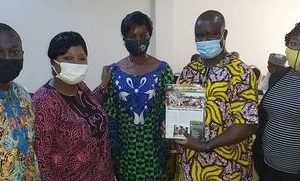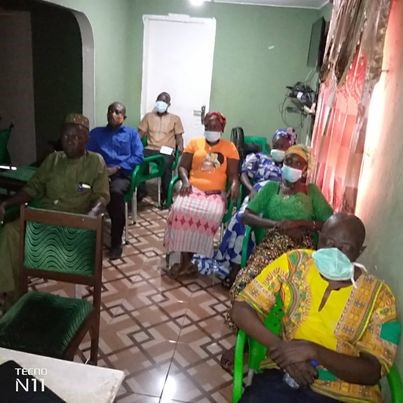PHOTO: Liberian and Nigerian participants on site back home via zoom
The challenges, threats, barriers and risks faced, especially by grassroots environmental, land and human rights defenders in West Africa, is the focus of a three-day regional conference from 29 – 31 March 2021.
About 300 international, regional and local community actors gathered in a virtual conference to elevate the plight of frontline grassroot defenders, with the Special Rapporteur on Human Rights Defenders and Focal Point on Reprisals in Africa, Commissioner Rémy Ngoy Lumbu, delivering the keynote address.
While describing local people as “first defenders in isolated communities,” Commissioner Lumbu said the conference presents an opportunity for participants, especially those working in the field as frontline human rights defenders to network for protection of the environment and local communities.
Surprisingly, he disclosed that there is no account of killings, reprisals, and attacks against defenders in the region, and therefore challenged defenders to report cases to his office to have them forwarded to the African commission for prompt actions.
He said “…when we hear from you, we can easily contact people in government to act.” Adding, “I am a member of a working group on indigenous people, and we have an emergency system of reporting reprisals so that it can be stopped.”
Convening on the theme, “Securing the Firewall and Connecting the Unconnected: Frontline Defenders Across West Africa,” the conference, is being held under the auspices of Green Advocates International, the Mano River Union Civil Society Natural Resources Rights and Governance Platform (MRU SCO Platform) and the Schell Center at Yale Law School, with funding from the Open Society Foundation.

Participants are expected to validate a Baseline Assessment Report conducted in all West Africa countries and Equatorial Guinea. A Community-based Protection Protocols, Tools to Establish a Support and Response Mechanism, Policy Recommendation and Safe Communication Infrastructure for grassroot defenders across West Africa, will also be endorsed.
The Assessment Report indicts governments across the region and the Sahel for inviting multinational corporations into their countries and apparently leaving them to operate at the expense of the indigenous communities who are left to scramble for survival in their own countries with no protection in the name of foreign investment.
Strangely, the report also calls out government for not only failing to provide protection, but are often the main violators of the rights of the people, by siding with multinational corporations and doing very little to protect their own citizens from attacks from extremist organizations, vigilantes, criminal gangs, bandits and paramilitary militias.
Earlier in his welcome and introductory statement, the Chairman of the Steering Committee of the MRU SCO Platform, Dr. Michel Yoboue corroborated the assertion by the AU Commissioner regarding the lack of data on the attacks on grassroot frontline defenders.
Chairman Michel emphasized that “due to the lack of a comprehensive reporting, monitoring and documentation of reprisals, attacks and killings, compounded by an acute underreporting and lack of visibility that is now being exacerbated by COVID-19, it is difficult to verify cases of human rights violations, especially the number of defenders and indigenous peoples arrested, facing frivolous charges, murdered annually or labelled as terrorists, mercenaries, anti-government or saboteurs.
He said criminalization, stigmatization, the shrinking of civic spaces as well as legislations and a policy landscape that impedes the work of defenders, local communities and indigenous peoples are on the rise in the region. He further asserted that defenders are being murdered with no investigations and prosecution of the perpetrators in each of the 17 countries studied, in the last three years alone.
Dr. Yoboue observed that “Even though the Republic of Guinea is not emblematic of all countries considered for the study, it is troubling that while the September 28, 2009, stadium massacre of about 157 victims is still awaiting justice, the Guinean army and security forces have been on a shooting spree, especially the notorious “berets rouges.”
Dr, Yoboue, is also the Executive Director of the Research and Advocacy Group for Extractive Industries (GRPIE) in Côte d’Ivoire.
The Guinean army has been linked to cold bloody massacres in the village of Zoghota in 2012 and the mass shootings in Area One, near Siguri in the Kitinian region during the same period. There are also unresolved investigations and killings of 23 persons linked to a gold rush allegedly by vigilantes and the inaction of the government security forces.
This troubling trend in Guinea, as recorded in the study report, is added to the recent electoral violence, where about twenty people were killed. Cote d’ Ivoire, Ghana and the recent SARs protest campaign in Nigeria are all examples of how the region has turned into a dangerous place for defenders.
Among other things, the report reveals what Frontline Defenders in Northern Nigeria, Niger, Burkina Faso and Mali, referred to as “the Desert of Death,” wherein communities and villagers facing the agony of the Climate Crisis, are held captives in a pentagonal death trap and a web of killings between competing actors: including government forces, paramilitary militias, criminal gangs and bandits, and extremist organizations.
The baseline report is a product of interviews with key informants, desk review, and profiles of grassroot defenders, who shared their experiences, knowledge, lessons learned, skills, expertise, and practices in the shrinking environment for human rights activism and respect for the rule of law.
Defenders who dare ask questions about contracts between governments and multinational companies in the mining, logging, and mineral sectors, as well as those who focus on land rights, environmental issues, or highlight corruption, are often labelled and targeted.
Among other speakers, the UN Special Rapporteur for Human Rights Defenders, Prof. Mary Lawlor; the UN Special Rapporteur for Indigenous Peoples, Prof. Francisco Cali Tzay; Dr. Anne Chabord, Legal Advisor to the UN Special Rapporteur on Countering Terrorism, and the UN Special Rapporteur for Human Rights & the Environment, Prof. David Boyd, all made special remarks and presentations on the situation in the region.
The Mano River Union Civil Society Natural Recourses Rights and Governance Planform (MRU-CSO Platform), is a network of environmental and human rights defenders; indigenous, urban slums and squatter communities; communities affected by the operations of multinational corporations; bloggers, labor unions and poor informal entrepreneurs on the frontline of corporate investments in West Africa. Its membership is drawn from nine countries in West Africa. Namely: Liberia, Sierra Leone, La Cote D’Ivoire, Guinea, Ghana, Mali, Nigeria, Niger and Senegal. For more information, contact: Abu A. Brima in Freetown @ abu.brima@nmjdsl.org; YOBOUE MICHEL in Abidjan @ myoboue@gmail.com ; Augustine Niber in Accra @ augor8@yahoo.com ; Chima Williams in Nigeria @ princewchima@yahoo.co.uk ; Alfred Brownell in the USA @ Alfred.brownell@elaw.org +1 (541) 2552399) and the Secretariat in Monrovia @ mrucsoplatform@gmail.com (+231555139602)

